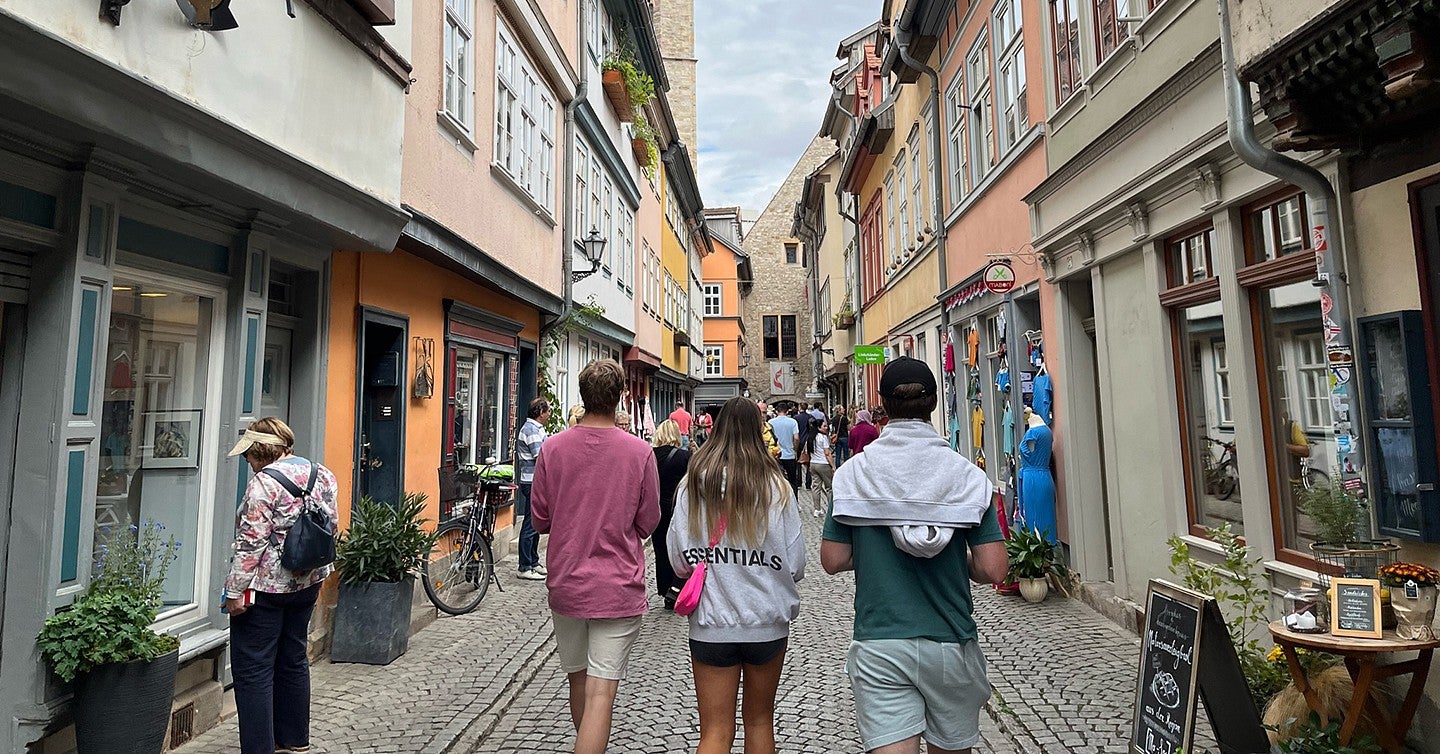
Take your studies overseas
Financial support for studying abroad:
CHC Study Abroad Scholarships
GEO Study Abroad Scholarships
Financial Aid for Study Abroad
This summer, Clark Honors College students and others will set off abroad to learn about public policy, history, politics, and more. Alumni and current students spoke to the CHC Post about their time abroad with the Clark Honors College. Learn about how their experiences have shaped them and see what they want future study abroad participants to know about the benefits of traveling.

Embracing Rememberence in Berlin
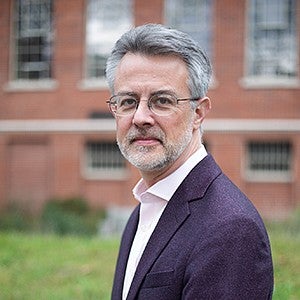
In Berlin, students will embrace what it’s like to live in Germany’s largest city – both in the present day and when a wall divided it. During the four-week program, students will see how a city damaged during World War II has worked to remember its past, how subcultures have thrived in its unique neighborhoods, and how people live there today.
Ian McNeely, a CHC core faculty member and history professor who leads the program, weaves the city’s history in with discussions of social policy in the European Union to create an immersive abroad experience. Students complete two Honors College colloquium classes and the global perspectives requirement during the trip.
“It’s your foot in the door to the big world out there,” says McNeely. “You don’t need to love Germany or be a history major. Just get out of the country at least once while you’re still young enough that it can make an impact in the future.”
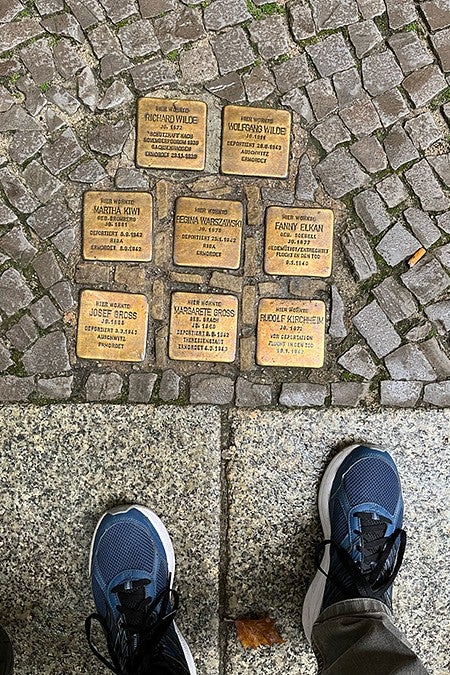

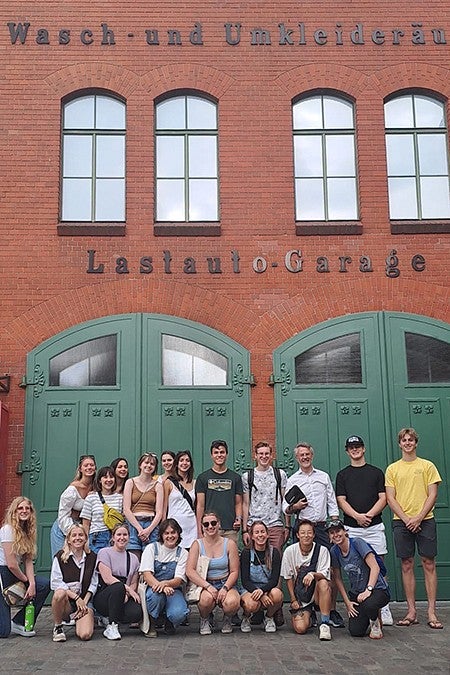
While on the program last summer, Kyle Stupfel, an Honors College junior, learned how “being able to know your past sets you up for your future.” In Berlin, he investigated the city’s unique neighborhoods, getting to know the resident’s way of life on a more intimate level than any of his previous travels.
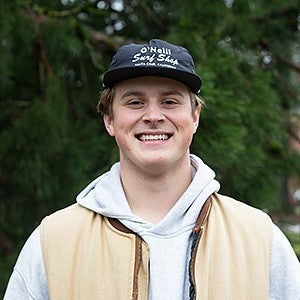
As a neuroscience major, he was interested to see how he would do in a humanities-focused program – but the policies and customs of Berlin opened his mind to new ways of thinking of the world.
What was most memorable about your experience?
“One of the biggest things that sticks out to me about Berlin is (its) memorials,” he recalls.
During the trip, Stupfel’s group visited the Sachsenhausen Concentration Camp Memorial, just north of Berlin. The proximity of the camp to residential neighborhoods struck him. “These places were so ingrained -- this was just another part of a city at the time. There were people living right there.”
After the Holocaust, the camp was converted into a memorial. “(Germans) are able to talk about these things in a way that, for some reason, Americans are not able to,” he says. “They actually know how to remember their past.”
What advice would you give to students who plan to study abroad this summer?
“Going on a long study abroad trip, you start to miss your friends. You start to miss your family,” he recalls. “And that's just very normal. But looking back on it, you don’t really think about those things. You will come back remembering all places that you went to and all the lessons that you learned.”
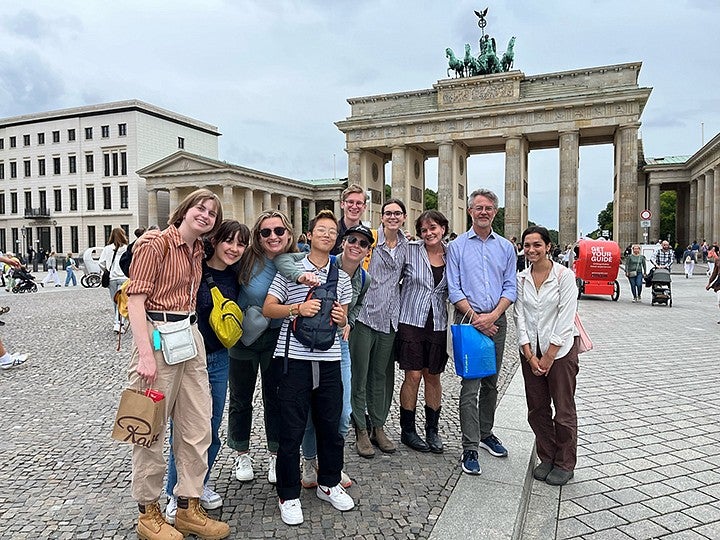
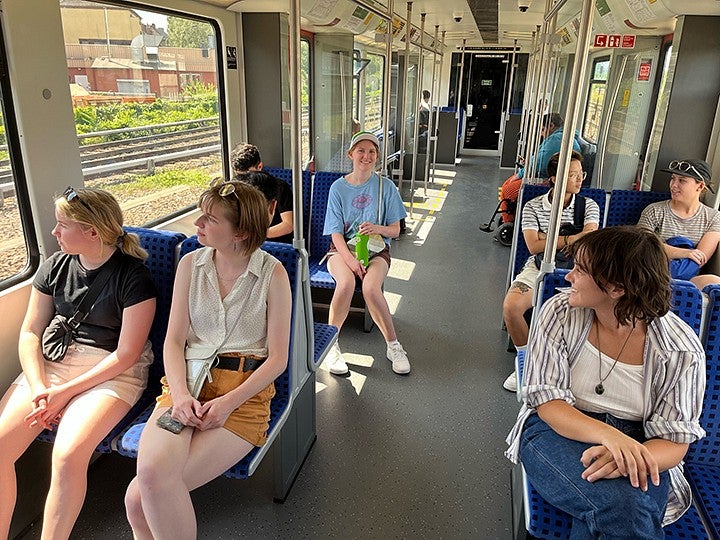
Madeleine Getz, a senior studying at UO, says her time in Berlin made her eager to keep traveling. Her month abroad was marked by exploration of the city’s sights, new lifestyles, and her individual passions.
It’s not often that you have the freedom to engage with the world in that way as a young adult, she says. The program gave her the opportunity to develop an appreciation for a new setting and culture, without all the responsibilities she carries at home.
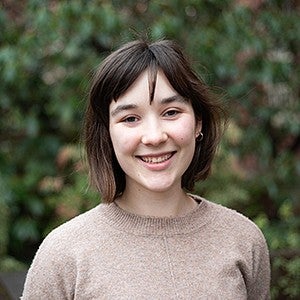
What was most memorable about your experience?
“It was awesome to go to class and learn about events that had happened in the city or social change in Germany, and then go out and see it in action,” she says. “I feel like it was definitely one of the most fulfilling academic experiences I’ve had.
“One of the things I remember most was visiting the Reichstag, which was the Parliament building in Germany. It was one of the last days, so it was just a really nice culmination of all the things we’d been learning about Germany's history and the city's history and its role in politics and culture.”
What advice would you give to students who plan to study abroad this summer?
“You get really familiar with your coffee shops, your favorite brunch spots, your favorite runs or hikes – you get familiar with your spaces,” says Getz. “And so being in Berlin was a really awesome opportunity because you’re pushed to explore and you’re also pushed to explore as the outsider, which I think is very humbling.”
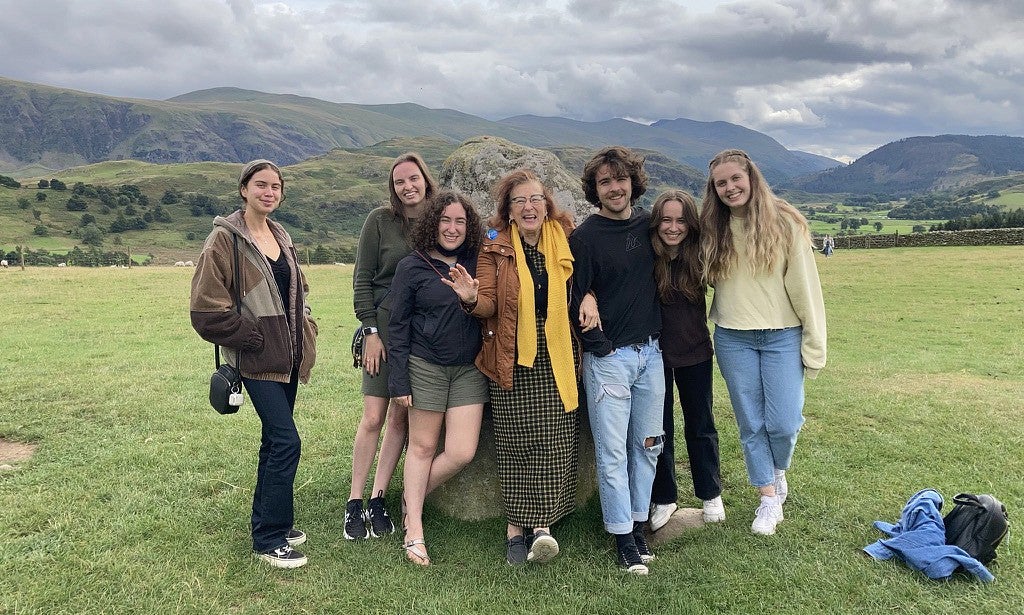
The leader in you: Environments of revolutionary imagination
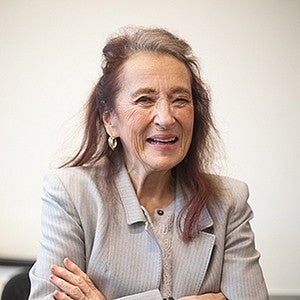
In Oxford, students will follow in the footsteps of genius, earning an arts and letters colloquium along the way. The program will be led by Julie Voelker-Morris, an instructor from the school of Planning, Public Policy, and Management, and CHC Professor of Practice Barbara Mossberg.
The program is guided by exemplars: geniuses ranging from Albert Einstein to J.R.R. Tolkien. In the morning, students will learn about these revolutionary thinkers. Then, they’ll spend afternoons visiting the same sights where their exemplars stood – often hundreds of years prior.
“When you see yourself through the lens of other cultures, you become new and exciting and interesting to yourself,” says Mossberg. Like the intellectuals they’ll study, students use travel to discover new parts of themselves within an unfamiliar environment.

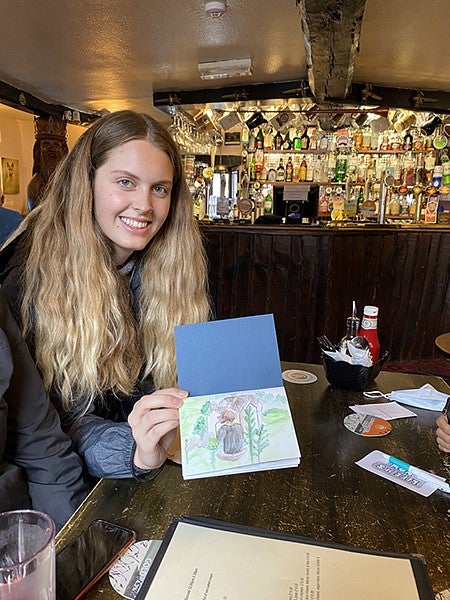
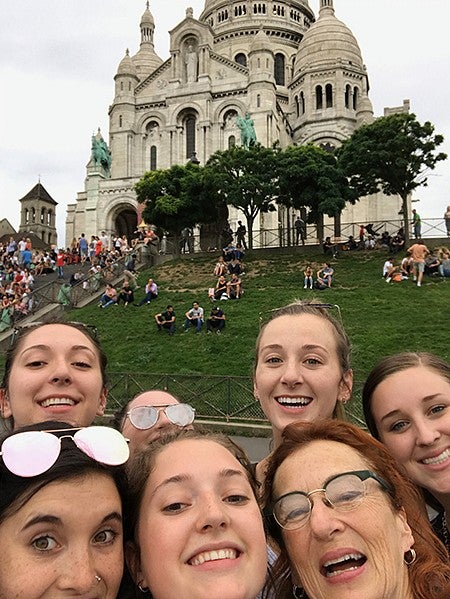
Jeff Hodson, who graduated from UO with a philosophy degree in 2016, took his first class with Mossberg during his senior year. He didn’t know what his thesis topic would be, and he knew he needed to make a plan, he says. Mossberg invited him to apply to her summer study abroad program and offered to help him shape his thesis.
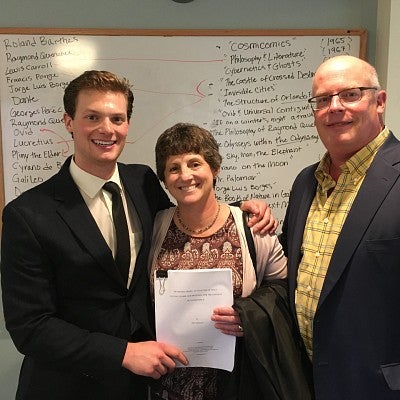
“It ended up being a great thesis,” Hodson says. “I did well on it and was super excited about it. I think it kind of revealed the part of myself that I didn't really know was there.”
Now, Hodson is first vice president at CBRE Group, Inc., a real estate company with offices all over the world.
What did you learn on the trip?
“I think what I probably brought back was a little more self-knowledge and a little more energy to apply to stuff I was interested in,” he says.
“I have a lot of skills because I had a lot of good teachers. But I never really took that somewhere for myself, and I think that in really being with people who I didn’t really know at the beginning and were very much different (from me), I was able to apply the stuff I had learned.”
What advice would you give to students who plan to study abroad this summer?
“Life keeps coming pretty fast,” he says, “and we've all been on prescribed paths, from kindergarten all the way through college, right? And then as soon as you’re done with college, you’re like, ‘Shoot. I guess I can go do whatever I want now.’ But we don’t really practice having those options. And studying abroad – it’s hard to not come back with some additional perspective.”
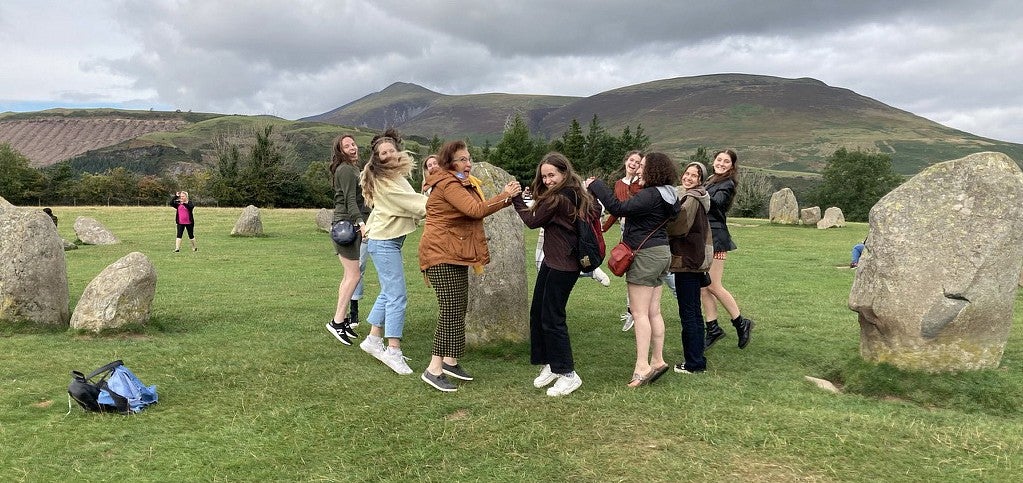
Hanna Minns studied abroad in 2017, during the summer before her junior year. She chose an exemplar she could relate to: Hedy Lamarr, a famous actress and inventor.
The trip helped her reconcile her love of both science and the arts. Mossberg’s guidance during the program set her up for success in her final years at UO, where she took courses in many subjects along with her biology major.
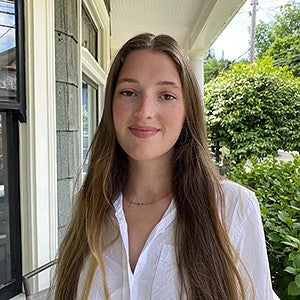
Minns graduated in 2019 and is now an MD-PhD student at Oregon Health and Science University.
What did you learn on the trip?
“I was interested in what I thought were two very different fields and was struggling with how I could find creativity within the sciences,” she says. “Being able to study (exemplars) who were so interdisciplinary made me realize that all of the fields are interconnected, and you should allow yourself to be inspired by all of them.”
What advice would you give to students who plan to study abroad this summer?
“Be willing to put yourself out there and make new friends and get out of your social comfort zone,” she says.
“After the program we had multiple get togethers. You continue the connection with (Mossberg) and with the people that you were abroad with. (My) relationships with these people didn’t just end after the summer. They carried on through my time at UO and the Honors College.”
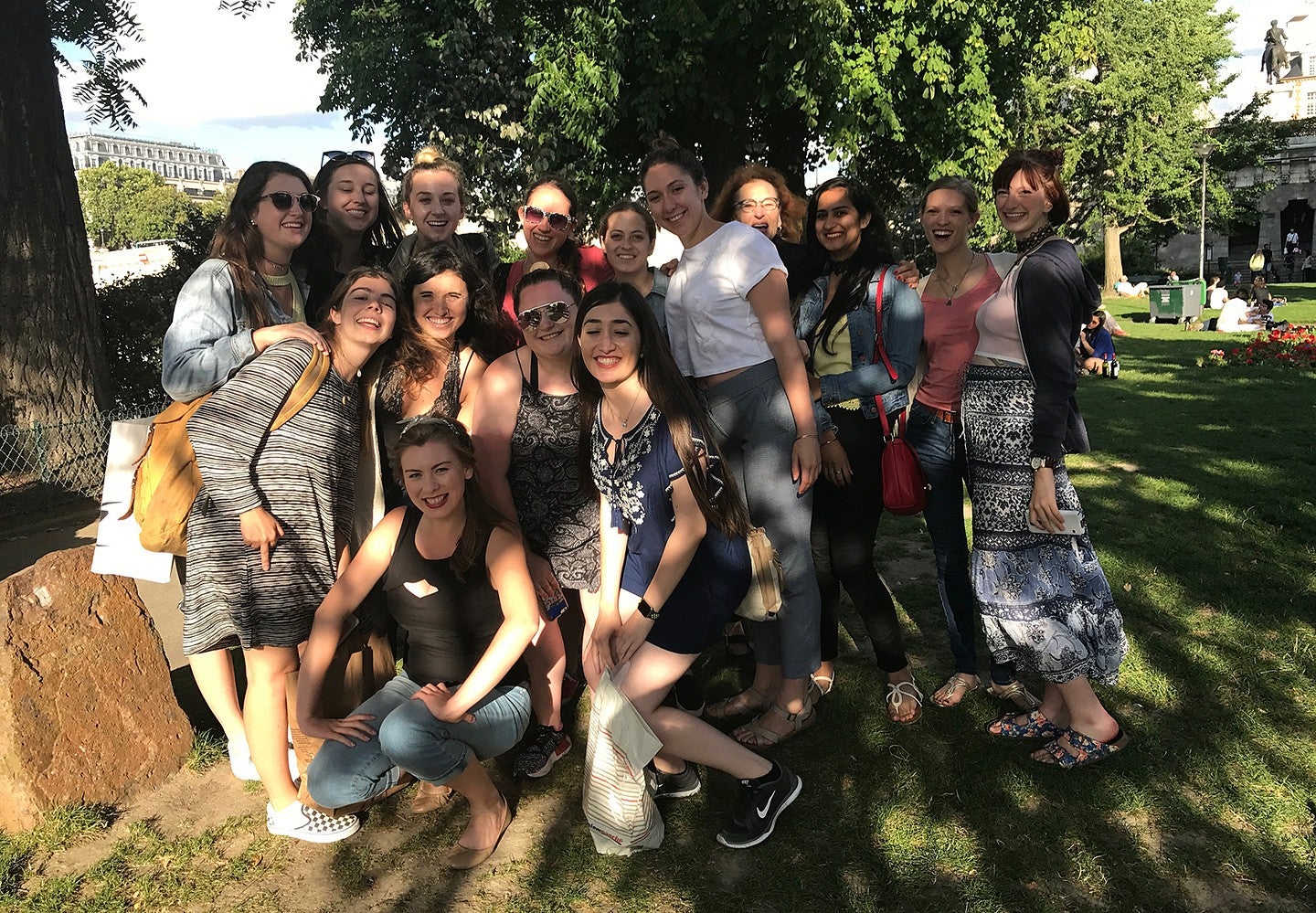
A Taste of the Honors College in London
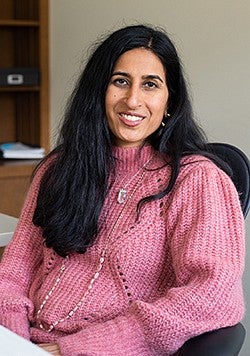
Opportunities to go abroad this summer aren’t limited to current students. Incoming freshmen have the chance to travel to London and experience a preview of the Honors College experience with Associate Professor Anita Chari.
Chari, who teaches political science, will be leading her class “Music and Politics,” which covers popular music and musical traditions within the context of politics. In London, students will visit different neighborhoods to explore their musical histories and speak to local experts.
“I think that is one of the most valuable things that we can do is to make ourselves strangers somewhere, to put ourselves in experiences that are kind of disorienting but also exciting for that reason so that we can kind of learn a different way of being,” says Chari, who has spent time abroad since she was a child.
The program will be four weeks and allow students to earn nine credits and fulfill two honors college requirements. Students must be 18 by the programs departure date to apply. For more information, visit the program’s GEO page.
